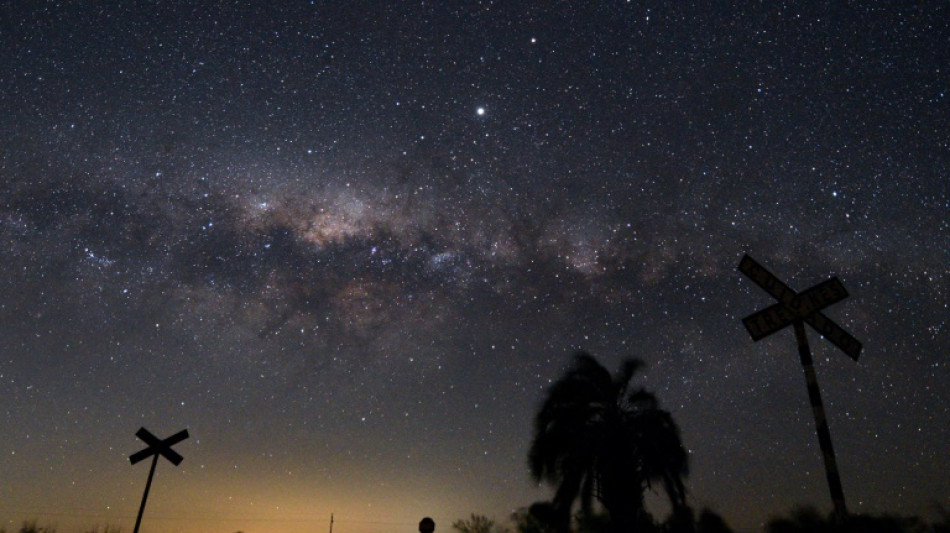
-
 Scotland captain Tuipulotu grateful for Wales boss Tandy's influence
Scotland captain Tuipulotu grateful for Wales boss Tandy's influence
-
Zelensky says no 'family day' in rare personal interview to AFP

-
 Zelensky tells AFP that Ukraine is not losing the war
Zelensky tells AFP that Ukraine is not losing the war
-
Sweden to play Switzerland in Olympic women's curling final

-
 Counting the cost: Minnesota reels after anti-migrant 'occupation'
Counting the cost: Minnesota reels after anti-migrant 'occupation'
-
UK police probe Andrew's protection as royals reel from ex-prince's arrest

-
 Doris says Ireland must pile pressure on England rising star Pollock
Doris says Ireland must pile pressure on England rising star Pollock
-
US military assets in the Middle East

-
 Neymar hints at possible retirement after World Cup
Neymar hints at possible retirement after World Cup
-
Stocks rise after court ruling against US tariffs

-
 Australia end dismal T20 World Cup by thrashing Oman
Australia end dismal T20 World Cup by thrashing Oman
-
Olympics chief says Milan-Cortina has set new path for Games

-
 Russian SVR spy agency took over Wagner 'influence' ops in Africa: report
Russian SVR spy agency took over Wagner 'influence' ops in Africa: report
-
Pegula fights back to sink Anisimova and reach Dubai final

-
 Trump administration denounces 'terrorism' in France after activist's killing
Trump administration denounces 'terrorism' in France after activist's killing
-
Colombia's Medellin builds mega-prison inspired by El Salvador's CECOT

-
 German broadcaster recalls correspondent over AI-generated images
German broadcaster recalls correspondent over AI-generated images
-
US Supreme Court strikes down swath of Trump global tariffs

-
 England's Itoje says managing 'emotional turmoil' key to 100 cap landmark
England's Itoje says managing 'emotional turmoil' key to 100 cap landmark
-
Trump says weighing strike on Iran as Tehran says draft deal coming soon

-
 Tudor is '100 percent' certain of saving Spurs from relegation
Tudor is '100 percent' certain of saving Spurs from relegation
-
Azam dropped for scoring too slowly, says Pakistan coach Hesson

-
 Stocks volatile after soft US growth data, court ruling against tariffs
Stocks volatile after soft US growth data, court ruling against tariffs
-
Italy bring back Capuozzo for France Six Nations trip

-
 From Malinin's collapse to Liu's triumph: Top Olympic figure skating moments
From Malinin's collapse to Liu's triumph: Top Olympic figure skating moments
-
Arteta urges Arsenal to 'write own destiny' after title wobble

-
 Ukraine Paralympics team to boycott opening ceremony over Russian flag decision
Ukraine Paralympics team to boycott opening ceremony over Russian flag decision
-
Wales captain Lake wants fans to bring 'noise' against Scotland

-
 Skier Vonn's Italian hospital a hotbed of men, sister says
Skier Vonn's Italian hospital a hotbed of men, sister says
-
India target S.Africa top order, Abhishek to come good: bowling coach

-
 Carrick praises Man Utd 'diversity' after Ratcliffe's immigrant rant
Carrick praises Man Utd 'diversity' after Ratcliffe's immigrant rant
-
I never thought it would be hit, says 'Scream' creator 30 years later

-
 AI summit statement delayed to 'maximise' signatories: India
AI summit statement delayed to 'maximise' signatories: India
-
Barcelona's Sagrada Familia basilica hits peak height

-
 Milan sprints to second straight UAE stage win as Tiberi keeps lead
Milan sprints to second straight UAE stage win as Tiberi keeps lead
-
US GDP growth misses expectations as Trump blames shutdown

-
 Benfica investigate video of fans' monkey gestures
Benfica investigate video of fans' monkey gestures
-
French minister pledges tight security at rally for killed activist

-
 Guardiola 'couldn't care less' about Arsenal stumble in title race
Guardiola 'couldn't care less' about Arsenal stumble in title race
-
UK police search property as royals reel from Andrew's arrest

-
 Germany's Merz to visit China next week
Germany's Merz to visit China next week
-
Kompany says Mourinho made 'huge mistake' in Vinicius racism row

-
 X appeals EU's 120-mn-euro fine over digital content violations
X appeals EU's 120-mn-euro fine over digital content violations
-
Galthie recalls hulking locks Flament, Meafou for Italy

-
 Turkey, Saudi sign major solar power deal
Turkey, Saudi sign major solar power deal
-
US Olympic freeskier Hess embraces 'loser' tag after Trump blast

-
 European stocks rebound, oil prices ease after US-Iran volatility
European stocks rebound, oil prices ease after US-Iran volatility
-
'Alpha male' AI world shuts out women: computing prof Hall

-
 New Zealand freestyle skier Ives in hard Olympic crash
New Zealand freestyle skier Ives in hard Olympic crash
-
New Zealand must adapt quickly to Sri Lanka wickets: Chapman


Star visibility eroding rapidly as night sky gets brighter: study
Light pollution is growing rapidly and in some places the number of stars visible to the naked eye in the night sky is being reduced by more than half in less than 20 years, according to a study released Thursday.
The researchers, whose findings were published in the journal Science, said the increase in light pollution -- skyglow -- that they found was much larger than that measured by satellite observations of Earth at night.
For the study of the change in global sky brightness from artificial light, the researchers used stellar observations from 2011 to 2022 submitted by more than 51,000 "citizen scientists" around the world.
Participants in the "Globe at Night" project run by the US National Optical-Infrared Astronomy Research Laboratory were given star maps and asked to compare them to the night sky at their location.
The change in the number of visible stars reported was equivalent to a 9.6 percent per year annual increase in sky brightness, averaged over the locations of the participants, the researchers said.
Over an 18-year period, given such star brightness change, a location with 250 visible stars would see that number reduced to 100.
Most of the naked-eye star observations came from Europe and the United States said Christopher Kyba, one of the authors of the study, but there was also good participation in Uruguay, South Africa and Japan.
"The global trend in skyglow that we measure likely underestimates the trend in countries with the most rapid increases in economic development, because the rate of change in light emission is highest there," the researchers said.
The study coincided with the replacement of many outdoor lights with light-emitting diodes (LEDs), but the researchers said the impact on skyglow from the transition to LEDs is unclear.
"Some researchers have predicted that it will be beneficial; others, that it could be harmful because of spectral changes or a rebound effect, in which the high luminous efficacy of LEDs leads to more or brighter lights being installed or longer hours of operation," they said.
According to the study, the global LED market share for new general lighting grew from under one percent in 2011 to 47 percent in 2019.
"The visibility of stars is deteriorating rapidly, despite (or perhaps because of) the introduction of LEDs in outdoor lighting applications," the researchers said.
"Existing lighting policies are not preventing increases in skyglow, at least on continental and global scales."
- 'Confronted with the cosmos' -
Kyba, a physicist at the German Research Center for Geoscience, told AFP that while the team was able to evaluate erosion of star visibility due to skyglow, not a lot of research has been done on its ecological impact.
"There's tons of research on light shining directly on animals and plants," he said. "But it's really hard to do experiments on the impact of skyglow.
"You're not going to do something like just turn off New York City and see what happens in the East River."
Science aside, light pollution has changed the character of the night sky.
"For all of human history, when people went outside at nighttime, they were sort of confronted with the cosmos, at least on clear nights with no moon," Kyba said.
"You'd walk outside and there's the stars, there's the Milky Way. It's there and it's shining down on you," he said.
"And now that's like a really unusual experience," he said. "It surely makes a difference to us as people that we don't have this experience that used to be a very universal experience."
The Globe at Night campaign hosts an interactive data map at globeatnight.org and is seeking volunteers to collect more observations in 2023.
M.A.Colin--AMWN


